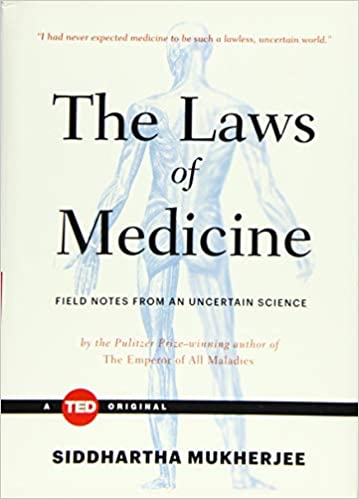The Laws of Medicine: Field Notes from an Uncertain Science by Dr. Siddhartha Mukherjee
We’ve been trained—from childhood—to trust our doctors; some patients trust their doctors absolutely. For many, it can be unnerving to hear a doctor discuss what he or she doesn’t know—and admitting that what we do know about medicine is a tiny speck in the vast universe of what has yet to be discovered.
It’s strangely refreshing, then, to hear a doctor address this fundamental truth about medicine so directly and reassure us that the human element of navigating the unknown might be the most valuable resource we have in medicine, the so-called “youngest science.”
 “I had never expected medicine to be such a lawless, uncertain world,” writes Dr. Siddhartha Mukherjee in his book The Laws of Medicine: Field Notes from an Uncertain Science (Simon & Schuster, TED Books; October 13, 2015). Following his graduation from medical school, and during his internship, residency and fellowship, Mukherjee found himself running into as many questions as answers. “My medical education had taught me plenty of facts, but little about the spaces that live between facts,” he writes. “I wondered if the compulsive naming of parts, diseases, and chemical reactions . . . was a mechanism invented by doctors to defend themselves against a largely unknowable sphere of knowledge.”
“I had never expected medicine to be such a lawless, uncertain world,” writes Dr. Siddhartha Mukherjee in his book The Laws of Medicine: Field Notes from an Uncertain Science (Simon & Schuster, TED Books; October 13, 2015). Following his graduation from medical school, and during his internship, residency and fellowship, Mukherjee found himself running into as many questions as answers. “My medical education had taught me plenty of facts, but little about the spaces that live between facts,” he writes. “I wondered if the compulsive naming of parts, diseases, and chemical reactions . . . was a mechanism invented by doctors to defend themselves against a largely unknowable sphere of knowledge.”
To develop tools that would help him reconcile the known and the unknown, Mukherjee (the Pulitzer Prize-winning author of The Emperor of All Maladies) formulated three laws of medicine, “laws of uncertainty, imprecision and incompleteness,” he writes. “These are laws of imperfection.”
His first law tells us that “A strong intuition is much more powerful than a weak test.” To illustrate this principle, he tells the story of a 56-year-old man, a resident of Boston’s tony Beacon Hill neighborhood, who was complaining of fatigue and weight loss. An endless battery of tests turned up nothing. But Mukherjee’s chance glimpse of the man in the hospital lobby led him to a hunch that eventually uncovered the man’s malady. Mukerjee saw the man conversing with a former patient whom the doctor had treated for side effects from drug use. Soon after, Mukerjee found the answer: the man with the mystery condition was a heroin user and he had contracted AIDS. Without Mukerjee’s hunch, there’s no telling how long his patient’s illness would have gone undetected.
Mukerjee’s second law tells the reader that “‘Normals’ teach us rules; ‘outliers’ teach us laws.” For example, when doctors notice that patients with some neurological diseases, such as Parkinson’s, have a reduced risk of cancer it “represents an opportunity to refine our understanding of illness,” Mukherjee writes. “Pieces of data that do not fit our current models of illness have become especially important, not only because we are reassessing the nature of our knowledge, but also because we are generating more such pieces of data every day.”
Dr. Siddhartha Mukherjee’s TED Talk inspired a PBS documentary series by Ken Burns
In his third law, Mukherjee states that “For every medical experiment, there is a perfect human bias.” While every science is prone to human bias, Mukherjee tells us that in medicine, biases are “particularly acute.” One reason, he says, is hope. “We want our medicines to work,” he writes. “Hope is a beautiful thing in medicine—its most tender center—but it is also the most dangerous.”
The solution Mukherjee argues, isn’t eliminating biases, but acknowledging them. “The simplest way to tackle the bias problem is to confront it head-on and incorporate it into the very definition of medicine,” he writes. “The greatest clinicians that I know seem to have a sixth sense for bias . . . They understand the importance of data and trials and randomized studies, but are thoughtful enough to resist their seductions.
“Human decision-making, and particularly, decision-making in the face of uncertain, inaccurate and imperfect information, remains absolutely vital to the life of medicine,” writes Mukherjee. “There is no way around it.”
So to what degree should we trust our doctors? When making that decision, patients must remember that doctors are blending the titanic amount of raw data that medicine has accumulated over the generations with their inherent humanity and human ability. “The discipline of medicine concerns the manipulation of knowledge under uncertainty,” Mukherjee writes. “Abstract away the smell of rubbing alcohol and bleach; forget the adjustable beds and ward signs and the gleaming granite of hospital lobbies; erase, for a moment, the many corporeal indignities of a man in a blue cotton gown in a room or the doctor trying to heal him—and you have a discipline that is still learning to reconcile pure knowledge with real knowledge.
“The ‘youngest science’ is also the most human science,” Mukherjee writes. “It might well be the most beautiful and fragile thing that we do.”




